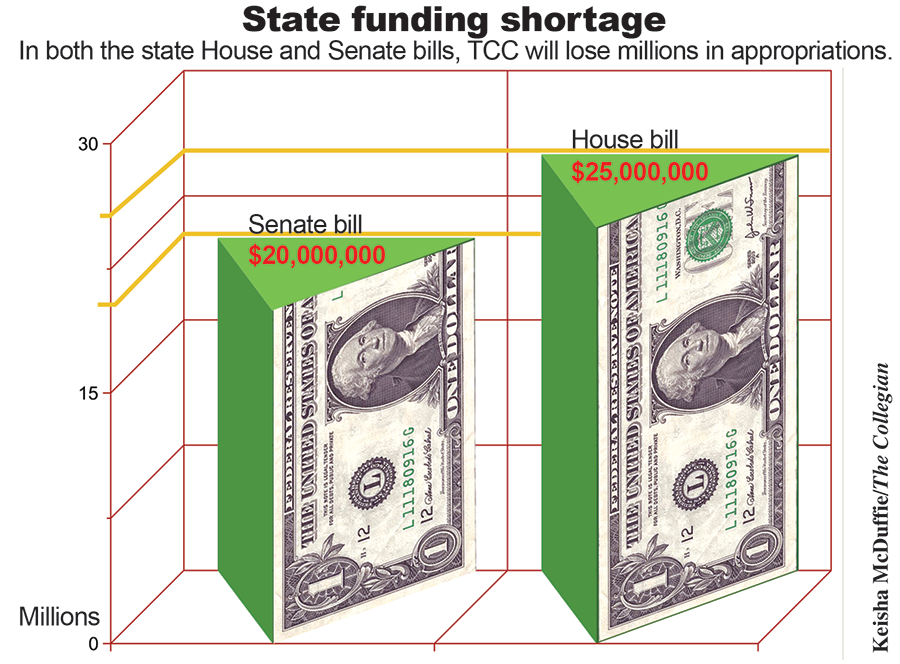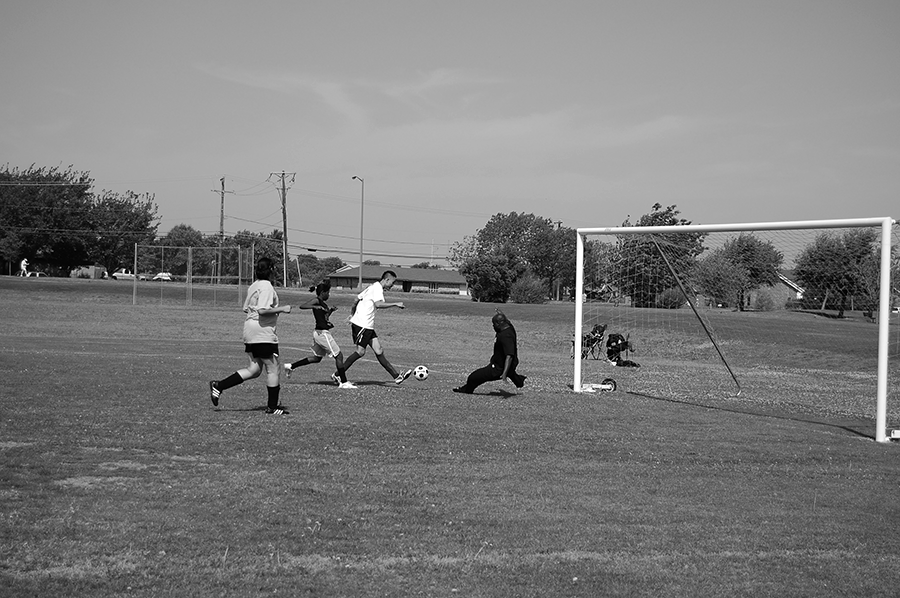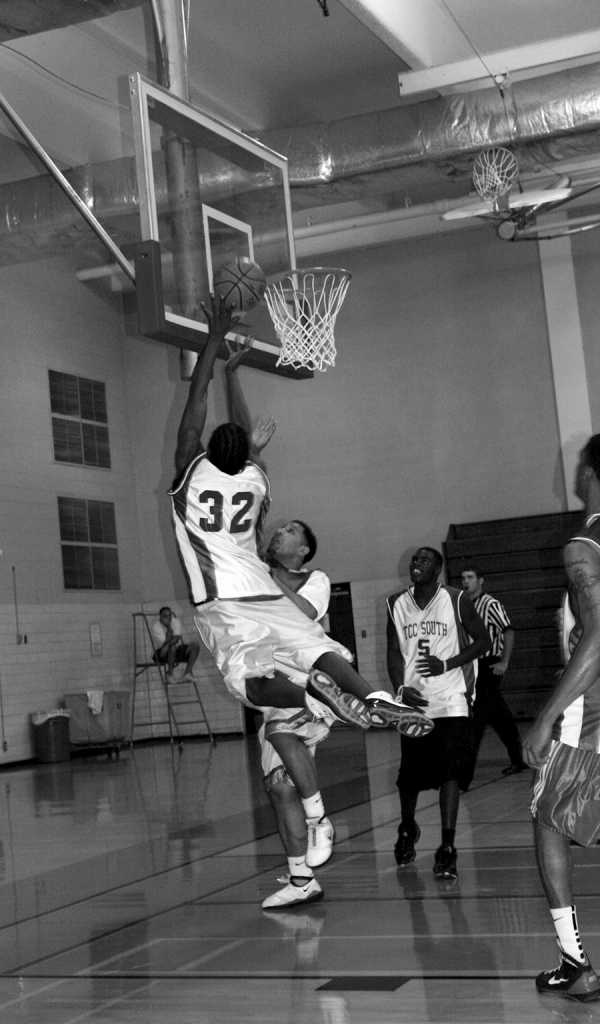
Casey Holder/The Collegian
NE student Mitchell Jones is going to school full time as well as being self-employed. But he is finding it harder and harder to keep up with both.
“I’m at the point where I have to taper one off,” he said. “It seems like I’m spending two to three hours a day just studying chemistry.”
Jones retired from the Marine Corps in 2006 after eight years in the service. When he started going to TCC, he had to start working less to study more.
“I’m only working six to seven hours a day now, and that’s definitely cutting into my ability to pay bills,” he said.
In the past, he has received help covering bills from his Basic Assistance for Housing, a part of the federal Post 9-11 GI Bill.
“BAH pays about one-third of my expenses,” he said.
But as he drops work hours, he will be losing part of his basic assistance for housing on Aug. 1 through no fault of his own.
That is when Public Law 111-377, passed by Congress and signed into law Jan. 1, goes into effect.
The law amends the Post 9-11 GI Bill that helps veterans pay for tuition and class materials and provides housing assistance while enrolled in graduate, undergraduate, training or certification programs at a recognized school, according to gibill.va.gov.
Under the current Post 9-11 GI Bill, the monthly housing allowance offsets living expenses so veteran students don’t need to work full time while going to class. The amount of assistance is determined by the cost of living in
the college’s ZIP code. Tuition assistance is available up to an amount set by the veteran’s home state.
How much students receive of their total tuition and housing benefits available depends on the number of months they served on active duty after 9-11.
Those who served 36 months or more receive 100 percent. Those who served 30-36 months receive 90 percent. And so on down to 10 percent.
When the new law takes effect, tuition and housing benefits for student veterans like Jones will be affected.
Under the Post 9-11 bill, a veteran continues to receive basic housing allowance for the weeks in between the fall and spring and spring and summer semesters when there is no class.
Veterans will no longer receive that interval or gap pay under the new law.
“Students receive no money for the time from the end of the fall semester to the beginning of spring semester which is about a month and comes right in the middle of the school year,” said Laura Wood, NW history and government professor and NW veterans’ club advisor. “It is not long enough to really obtain a job to earn money to cover what is not provided for the brief time period.”
But the smaller paycheck doesn’t come in the mail during the break when students like Jones who have a job can offset the loss by working more hours.
It comes the month after when school is back in swing, bills are due and the stomach needs food.
BAH isn’t a luxury allowance in any case. For TCC students, it runs about $1,212 to $1,563, depending on what campus the veteran attends. That pays the standard of living: food, rent and utilities. No dinners out, no emergency cash.
As a single guy with no dependents, the pay cut will be inconvenient and require adjustments for Jones, but for those veterans who are married or have children, the loss will be more keenly felt. Jones has one such friend.
“If he loses $100 a month, that affects his ability to feed his kids,” Jones said.
Tuition changes will affect TCC veterans ready to transfer.
Tuition payments to all in-state public colleges will be covered up to the veteran’s tuition percentage.
That’s good for students at TCC, the University of North Texas, and the University of Texas at Arlington.
However, a $17,500 annual cap will be put on all private and foreign schools. That includes Texas Christian University, Baylor, Texas Wesleyan and Southern Methodist University.
According to stripes.com, tuition changes were made to simplify the process of determining each veteran’s eligibility.
But now students will have to think twice about what college they transfer to.
“Last year, more than 126,000 veterans took classes at private colleges with GI Bill funding,” stripes.com said.
Collegeboard.com states that private nonprofit four-year colleges charge on average $27,293 per year.
Because of the $17,500 cap, veteran students will have $9,793 to cover on their own, and that price tag includes only fall and spring semesters. Most veterans attending school full time go year-round and so have additional costs for summer semesters.
This cap will be a big factor when students look at degree options and schools that will give them the best start.
“It’s ridiculous to deter students from going to a good private school, but that’s what these changes do,” Derek Blumke, co-founder of Student Veterans of America, told stripes.com.
Other changes to the Post 9-11 GI Bill include the new ability to use tuition assistance to cover non-college degree programs such as on-the-job-training and or flight school.
Students on active duty will be eligible for the same benefits as other veterans, including books and materials they previously had to pay for themselves.
Veterans enrolled only in distance learning are now eligible for half the housing assistance, according to the national standard of living. They weren’t eligible for any housing assistance under the Post 9-11 bill.
“It is good that they are finally providing a living expenses stipend for those who take online courses as this was a real problem for some students and did seem to be unfair,” Wood said.
But no matter those changes, Jones doesn’t want to postpone getting his degree. He already feels he is getting a late start on the education road, and being self-employed isn’t a very secure position to be in, he said.
So Jones is preparing to do whatever is necessary to cut expenses.
“If I have to sell my house, I’ll sell my house,” he said. “I don’t know how to cook. I go out a lot. That will have to stop.”




























